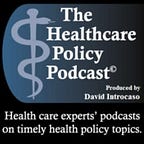In February the CDC released its latest Youth Risk Behavior Survey findings. Somewhat needless to say the data is discouraging. For example, in 2021 40% of high school students, 60% of high school female students and 70% of high school LGBQ students reported feeling sad or hopeless. Among other findings, 22% of high school students had seriously considering suicide, 18% made a suicide plan and 10% had attempted suicide - these percentages are the highest reported since the first Youth Risk Behavior survey was first fielded in 2011.
During this 36-minute interview Dr. Trede and Ms. Shapiro begin by discussing Youth Risk Behavior Survey findings concerning sadness and hopelessness, data concerning girls, LGBQ students and suicidality generally. They discuss timeliness of care and care integration, self harm, therapeutic approach, alternative therapies, the importance of modeling pro social behaviors, and they note subject areas to improve behavioral health policy including policies to help remove the stigma associated with behavioral health and improve family support.
Dr. Felix Trede serves as the East Boston Neighborhood Health Center/South End Community Health Center Behavioral Health Clinician and Training Coordinator. Dr. Trede began his career as a clinical case manager/rehabilitation specialist with Bay Cove Human Services in Boston in 2008. He joined the Behavioral Health team at SECHC as an intern in 2014 before joining as a full-time staff member in 2018. He earned his Psy.D. at William James College.
Ms. Laura Shapiro serves as an East Boston Psychiatric/Mental Health Nurse Practitioner. Laura’s career in pediatric and community health nursing begin in 1999 when she graduated with her BSN from Simmons College. As an RN, Ms. Shaprio worked as a school nurse for the City of Medford. During that time, she received an M.Ed in educational administration from Bridgewater State University and began her PMHNP studies. She graduated from Northeastern University in 2013 with an advanced practice degree and completed her practicum at Lynn Community Health Center where she provided psychiatric consultations at their school-based health centers. In 2021, she began working at EBNHC as a mental health nurse practitioner. Laura also sees patients in private practice and is an adjunct faculty at Northeastern University's Accelerated Bachelor of Science in Nursing program.
The CDC’s Youth Risk Behavior Survey is at: https://www.cdc.gov/healthyyouth/data/yrbs/yrbs_data_summary_and_trends.htm.
Information regarding the East Boston Neighbor Health Center is at:
https://www.ebnhc.org/.
.




